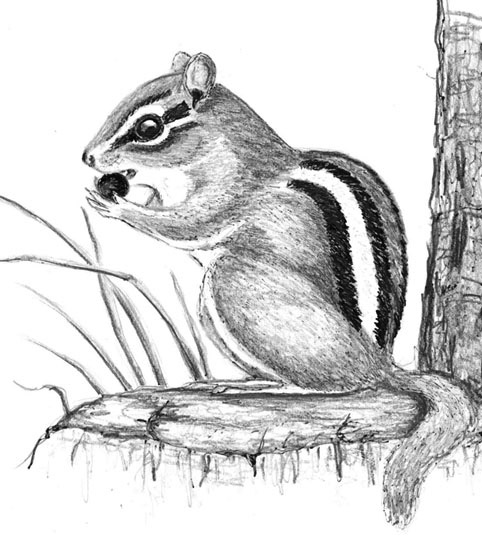
Dear Bird Folks,
Could you please listen to a recording I made on my iPhone and tell me what kind of bird this is? The monotonous call sometimes lasts for five minutes without a break, but I can never find the bird.
– Terence, Rhinebeck, NY
Gotta love smartphones, Terence,
I have repeatedly stated that I love camera phones. Instead of depending on vague and often conflicting descriptions of an unusual bird, customers can now simply show me a photo of the bird in question. New phones also have the ability to record sounds (even though most folks can’t figure out how to do it). An actual recording of a mystery bird eliminates the guessing game produced when an otherwise normal person tries to imitate what they’ve heard. He or she typically will generate a series of squawks, whistles and yodels, while everyone else tries not to laugh. We even had one lady, who must have been a piano teacher, write down a bird’s song in music form. On a piece of paper she had written a sequence of weird symbols, such as F-flat, D-sharp, AB negative and twelve to the 3rd power, or whatever, and thought I would be able to interpret it. I couldn’t, not even close. When it comes to identifying birdcalls, smartphone recordings are a better choice…but the old way is far more amusing.
Believe it or not, the bird on your recording isn’t a bird at all. The monotonous call you have been hearing is coming from our old pal, the eastern chipmunk. Chipmunks tend to be quiet, but when they spot danger they will give out a long series of repetitive “chip” notes, hence their name. You might think it be would safer for the little animal to remain silent until the danger passes, but as you’ve found out, tracking down the source of the sound is no easy task. Just this morning, before I started writing this column, I went for a morning bird walk and came upon a couple with a look of confusion on their faces. They walked right up to me, asking for help identifying a “chip” sound, which was driving them nuts. (See, Terence, you aren’t alone on this one.) I could hear the call, too, so I told them to relax and that I knew exactly what they were hearing. As they eagerly awaited my reply, I told them that the answer would be posted in the next edition of Ask the Bird Folks and walked away. (Nah, I told them about the chipmunk. Even I’m not that much of a total jerk…all the time.)
I find the eastern chipmunk to be one the most adorable and entertaining creatures in North America. They can run, jump, climb and carry a year’s worth of food in their faces. Of course, not everyone agrees with me on this. Bird feeder people complain they eat too much seed and that the traditional “squirrel-proof” feeders don’t keep them out. (I can help with that.) Gardeners detest chipmunks because they eat bulbs, seeds and berries. (I can’t help with that.) And sometimes their burrows and tunnels create problems for landscapers, but I’m on the chipmunk’s side here. Chipmunk tunnels are far less annoying than the giant landscape trucks and trailers that are always parked in the road and in my way.
While the above problems are true, chipmunks don’t do other things they are often blamed for. Unlike mice, chipmunks don’t want to live in your house. They reside outside in burrows and not in anyone’s attic, garage or breakfast nook. Here at work when the weather is nice, we like to keep the doors open to increase the flow of fresh air…and customers. As a result, we’ve had an assortment of uninvited creatures wander inside, including squirrels, raccoons, woodchucks, voles, skunks and on one Christmas Eve, a red fox (really). Chipmunks also love to sneak in through the open doors and help themselves to any bits of seed that have spilled on the floor. This is a good thing, since it not only saves us from ever having to do any sweeping, but we also get to hear unsuspecting customers scream when something furry runs across their feet. (I told you chipmunks are entertaining.) Occasionally, someone will close the doors, trapping a little chippy inside. But instead of hiding under the furniture, like the woodchuck did, the chipmunk will leap at the door in an effort to get out. Yes, a chipmunk may occasionally stray into your house, but no matter how lovely your guestroom may be, it doesn’t want to spend the night. Don’t take it personally.
If you aren’t a chipmunk fan, there is good news coming. Once the cold weather arrives, the tiny creatures will disappear. They spend the winter underground, in the burrows I mentioned earlier. But there’s also a bit of bad news. Chipmunks don’t hibernate, so between now and then they have to gather enough food for the winter. In other words, get ready to see a lot of fat faces coming from the direction of your feeders.
There appears to be some debate over the origin of the name “chipmunk.” For years, I have been telling everyone their relentless “chip” call is the reason for their name. Several sources back me up on this. However, others maintain the name is derived from “chetamnon,” a Native American word. One last theory claims the “chip” name has to do with the creature’s love of Fritos, but that could be merely an early attempt at product placement.
I’m glad I helped solve your mysterious sound, Terence. I’d write more on this topic, but it’s close to lunchtime and suddenly I’m hungry for a big bowl of chips. Maybe that product placement theory wasn’t so silly after all.